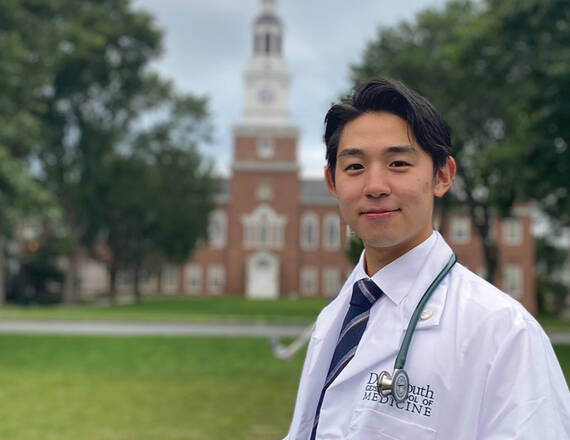Geisel Launches AI-focused Curriculum to Train Digital Health Leaders
When medical student Soo Hwan (Soo) Park ’25 came to Geisel School of Medicine, he noticed that the medical curriculum did not include courses involving digital health or the use of artificial intelligence (AI) models in patient care—and it concerned him.

Park recognized the growing presence of AI in healthcare fields, and he understood that future physicians would need to know how to use these tools, which can help medical practitioners provide more precise and more efficient patient care. The faculty and leadership at Geisel agreed with this evaluation of the future of AI in healthcare fields.
“The goal is to educate future physicians in the responsible use of AI and digital health in medical practice to improve patient outcomes and to build a cohort of leaders in the field,” says Thomas Thesen, PhD, associate professor in the Department of Medical Education and in the Department of Computer Science. “Right now, engineering companies are mainly driving AI in healthcare, and we think it’s important that physicians are part of this process.”
Many of Park’s classmates already had some relevant education in data science, bioengineering, mathematics, and other fields. So he wanted to help Geisel close the gap between those backgrounds and the medical school curriculum. To get the ball rolling, Park collaborated with several of his classmates to launch a pilot curriculum called Digital Health Scholars in 2022 when he was a second-year student.
“We believed we could leverage our backgrounds and skillsets to create something consistent with the need for AI-driven healthcare,” Park says. “We wanted to evaluate the effectiveness of an integrational curriculum that introduced foundational AI concepts into preclinical curriculum for first-year students.”
Ten first-year students enrolled in the non-credit elective course that ran in parallel with four existing curricular blocks: immunology, hematology, cardiology, and pulmonology. In the first portion of each block, students learned the high-level mechanism of an AI model (rather than the intricate mathematical workings) used in a research study pertaining to that block. Next, the course offered a live coding demonstration so the students could see the workings behind the AI model. Each block culminated in a presentation-discussion led by a speaker who was part of the relevant AI study.
The results of the student-driven research project, titled “Preparing healthcare leaders of the digital age with an integrative artificial intelligence curriculum” and published in the journal Medical Education Online, revealed there was a significant increase in the students’ perceived confidence in explaining AI-related topics after completing each block.
Park notes that although these AI models might not be part of every physician’s day-to-day role in patient care, the concepts will continue to become more relevant to the clinical landscape.
“There’s a growing need for physicians to become leaders in the intersection between medicine and technology. For example, they may work with technology companies to inform decisions about the ethics of how clinical data should be managed,” Park says. “There will be many opportunities for future physicians to engage in big data/AI-related medical work because they will be one of the primary users and eventually the evaluators of such technology.”
A Permanent Home for AI in the Curriculum
Starting in the fall, the medical curriculum will formally include AI-related education as part of longitudinal courses. Thesen is working together with Sonia Chimienti, MD, dean of Educational Affairs at Geisel, and others to develop the curriculum, which will run through all four years of medical school.
Chimienti notes that there are multiple ways AI technology can be embedded in the curriculum or incorporated into co-curricular experiences, including helping students learn the impact and the potential ethical challenges with the intersection of AI and data science in the healthcare ecosystem.
“We need to train physicians in a way that they can be expert diagnosticians and clinicians while also using artificial intelligence tools to help decision-making,” Chimienti says. “We have an extraordinary curriculum already; now, we’re thinking about empowering future physicians to advocate for patients as technology drives decision-making in healthcare—understanding both the benefits and limitations of technology, and how to apply these technologies in an equitable way in service of our patients.”
Students will also have access to AI study tools, Chimienti says. “Dr. Thesen has developed a chatbot for one of the pre-clerkship courses that can be used as a virtual tutor. Students can interact with the chatbot when it’s convenient for them, such as over the weekend when human tutors aren’t available,” she says. “It’s not replacing existing resources; rather it’s a technology-based supplement to the human touch. The virtual tutor can identify gaps in knowledge and guide the student to course material or supplemental resources to help with their mastery of the material taught in class.”
Park, who will be contributing to the curriculum development from a student perspective, is excited that future students will participate in these educational experiences.
“Ultimately, the objectives of such tools are to improve patient care,” Park says. “It’s important to stay up-to date with technology and … to explore what roles physicians will hold regarding this growing intersection between AI and healthcare.”